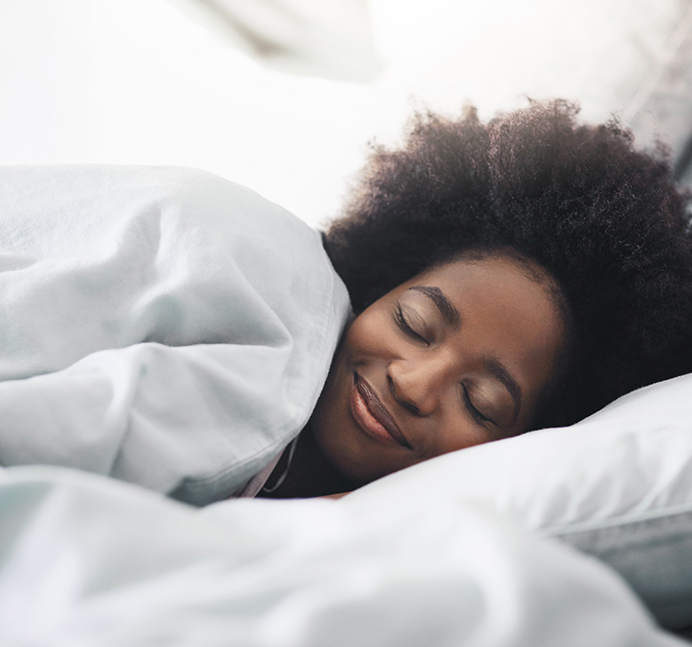Sleep Management
Right now, a good night’s sleep is more important than ever for you and your workforce. Poor sleep can affect both physical and mental health by suppressing the body’s immune system — making you more vulnerable to infections and less able to cope with stress.1 Help your employees stay healthy — and more engaged on the job — with our sleep management toolkit.
Jump to section
Help employees get better sleep
With the Rest and Revive toolkit, you get resources to help you assess your company’s needs, plan a strategy, engage your employees, and measure your program’s success. The full interactive toolkit is available for download below.
Please note: Due to the pandemic, some of the tips and tools provided in this kit may not align with CDC-recommended safety guidelines for COVID-19 prevention. For additional information, please visit cdc.gov.
Did you know
More than 1 in 5 people say their sleep quality is worse than usual since the COVID-19 pandemic began.
— SleepHelp.org, 20202

Build a sleep management program
Get leadership support and identify opportunities for healthy changes
Before you start a workforce health program like Rest and Revive, present a business case to your leadership team on the benefits of healthy activities and encourage them to show their commitment to workforce wellness. Then gather baseline organizational data with surveys to gauge your employees’ interest in healthy lifestyle activities
.
Also consider how your work environment supports living a healthy lifestyle. Think about the food in your vending machines, the walkability of your workspace, and whether you’re hosting healthy meetings.
Introduce the program to your employees
With employee feedback, you can plan your workforce health strategy and create a wellness committee to manage your program. Select a committee leader or your wellness coordinator to send out a promotional email
introducing the Rest and Revive program.
Be sure to include the program start date on the kickoff, if you’re having one. After you’ve sent the email, print and post promotional flyers, employee guides
, and other materials in kitchen and break rooms to increase awareness.
Tip
Host a kickoff event and invite one of your top executives to speak. Include a short demonstration of guided imagery.
Roll out the Rest and Revive program
Below you’ll find weekly guidance on what to send to your employees — so they stay informed and engaged throughout your program.
- Week 1: Send “Self-assessment and goal-setting" email.
Help your employees track their sleep habits and look for factors affecting their sleep. - Week 2: Send “Building a healthy foundation” email.
Learn about healthy sleep habits. - Week 3: Send “Understanding your sleep habits” email.
Have employees take the sleep survey and read what their responses indicate.
- Week 4: Send “Identifying sleep thieves” email.
Learn tips for dealing with sleep thieves like caffeine and alcohol. - Week 5: Send “Managing stress” email.
Use deep breathing to relax, and practice mindfulness as another daytime relaxation technique. - Week 6: Send “What if I still can’t sleep?” email.
Share tips on making healthy behavior changes. If one of your employees thinks they have a more serious condition, tell them to contact their doctor. - Week 7: Send “Assessing your plan and looking forward” email.
Congratulate your employees for completing the Rest and Revive program. Ask them to evaluate their progress and look back on what they learned.
Tools and resources
- Sleep workbook:
- Sleep log
- Daytime activity log
- Sleep action plan
- Personal notes
- Explore sleep topics from the National Sleep Foundation
- Share stories to refresh your employees’ minds, bodies, and spirits.
- Share podcasts.
- Share information on insomnia and the question of sleeping pills.
Measure your program’s success
Once you’ve finished the Rest and Revive program, you can evaluate its success by surveying the employees who participated and recording progress, participation, and interest. These results can help you improve and plan for future programs — like a healthy lifestyle or stress management program
— while employees are still motivated. You might also consider sharing participation numbers, health wins, and other positive outcomes with your employees.
Tools for Kaiser Permanente members
Ask your employees to take this health assessment, and we’ll guide them toward their goals.
Work with a coach to quit tobacco, manage weight, get active, reduce stress, and more.
Sign up for programs designed to help you achieve your health goals. Options vary by region.
Take advantage of reduced rates on studios, gyms, fitness gear, and online classes.
Additional resources you may find helpful



Footnotes
1Traci Speed, MD, and Luis Buenaver, PhD, “Managing Sleep Problems During COVID-19,” Johns Hopkins Medicine, April 21, 2020.
2“The Effects of COVID-19 on Sleep,” SleepHelp.org, accessed June 16, 2020.